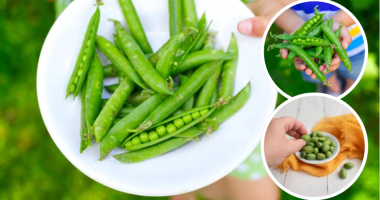Expert said “Tinned Fruit to Lower Heart Disease Risk: Can Canned be Better Than Fresh?” For many, fresh fruits often take center stage when it comes to heart health. But a recent statement by Professor Tim Spector, an esteemed Epidemiologist and Professor at King’s College London, has stirred the pot, suggesting that canned fruit might deserve a closer look. His bold claim? Canned fruit, under certain conditions, can be “as good, if not better” than fresh for optimizing your heart health. Let’s delve into the science behind this statement, addressing concerns, and exploring how to harness the potential benefits of canned fruit for a healthier you.

Professor Spector’s Perspective: Unpacking the “Canned vs. Fresh” Debate
Professor Spector’s recommendation stems from his research and analysis of existing scientific literature. He emphasizes the importance of focusing on bioavailability, the extent to which our bodies can absorb and utilize nutrients from food. In a 2018 scientific review published in the journal Prostate Cancer and Prostatic Diseases, he highlights that certain food processing methods, like canning, can sometimes enhance the bioavailability of specific nutrients.
However, it’s crucial to clarify that Professor Spector doesn’t advocate replacing fresh fruits entirely. He stresses the importance of dietary diversity and encourages incorporating both fresh and canned options for a well-rounded nutritional intake. So, the “better than fresh” statement refers to specific nutrient content and absorption, not a blanket replacement suggestion.
The Power of Lycopene: A Case Study in Heart-Healthy Canned Fruit
To understand the potential benefits of canned fruit, let’s take a closer look at lycopene, a powerful antioxidant found abundantly in fruits like tomatoes, peaches, and apricots. Studies have shown a strong link between lycopene intake and reduced risk of cardiovascular disease. A 2019 study published in the American Journal of Clinical Nutrition observed that high intakes or high-serum concentrations of lycopene were associated with significant reductions in:
- Stroke risk by 26%
- Mortality risk by 37%
- Cardiovascular disease risk by 14%
While this observational study cannot establish cause-and-effect, it sheds light on the potential protective role of lycopene. Interestingly, research suggests that canning tomatoes can actually increase lycopene bioavailability compared to raw tomatoes. During the canning process, the cell walls of tomatoes break down, making the lycopene more readily available for absorption.
And a more recent systematic review published in 2022 analysed 72 human and animal studies on lycopene.
It found 70 percent of the studies confirmed “various anti-cancer properties of lycopene”.
Beyond Lycopene: Exploring Other Heart-Friendly Benefits of Canned Fruit
Lycopene isn’t the only player on the field. Canned fruits offer a variety of heart-healthy nutrients:
- Potassium: Essential for regulating blood pressure, canned fruits like apricots and peaches deliver a good dose of this vital mineral.
- Fiber: Crucial for gut health and blood sugar control, canned pears and pineapple can contribute to your daily fiber intake.
- Vitamins: Canned fruits often retain essential vitamins like vitamin C and vitamin A, important for overall health and immunity.
While fresh fruits undoubtedly boast nutritional benefits, canning sometimes serves as a natural preservative, locking in vitamins and minerals that might otherwise degrade over time. This can be particularly advantageous for fruits that are out of season fresh or have limited availability in certain regions.
Cautions and Considerations: Making Informed Choices

Before you stock up on every canned fruit variety, it’s essential to address some potential downsides:
- Added Sugars: Some canned fruits are packed in sugary syrups, negating their heart-healthy potential. Opt for fruits canned in water or natural juices to avoid excess sugar intake.
- Sodium Content: Certain canned fruits might contain added sodium, which can be detrimental for individuals with hypertension. Look for low-sodium options or rinse canned fruits before consumption.
- Variety is Key: Don’t rely solely on canned fruits. Prioritize fresh options whenever possible and incorporate a diverse range of fruits in your diet for a broader spectrum of nutrients.
Remember, moderation is key. While canned fruits can offer valuable heart-healthy benefits, they shouldn’t replace a balanced diet rich in whole grains, vegetables, and lean protein.
Read Also | Cognitive Function: Practicing Music May Protect Aging Brain
Putting it into Practice: Tips for Enjoying Heart-Healthy Canned Fruit
Now that you have a better understanding of the potential benefits and considerations, here are some practical tips:
- Read labels carefully: Choose fruits packed in water or natural juices, focusing on varieties with no added sugars or minimal sodium.
- Drain and rinse: This helps remove excess sodium and syrups.
- Get creative: Use canned fruits in salads, smoothies, yogurt parfaits, or even homemade jams and chutneys.
- Combine with other heart-healthy ingredients: Pair canned fruits with nuts, seeds, or yogurt for added protein and healthy fats.
Addressing Common Concerns and Myths: Debunking Misconceptions
While Professor Spector’s perspective has sparked discussions, several concerns and myths surrounding canned fruit linger. Let’s address some of the most common:
- Myth 1: Canned fruits are less nutritious than fresh: While fresh fruits undoubtedly offer freshness and enzyme content, the nutrient profile of canned fruits can be comparable, especially with specific nutrients like lycopene. Additionally, canning sometimes acts as a natural preservative, retaining vitamins and minerals that might degrade in fresh fruits over time.
- Myth 2: All canned fruits are loaded with sugar and sodium: This isn’t entirely true. Look for options packed in water or natural juices, which are significantly lower in added sugars and sodium. Opting for low-sodium varieties or rinsing canned fruits further reduces sodium intake.
- Myth 3: Canned fruits are processed and unhealthy: Canning is a safe and regulated food preservation method. While some processing occurs, it doesn’t inherently make the food unhealthy. As with any food, moderation and smart choices are key.
- Myth 4: Canned fruits contribute to BPA exposure: Bisphenol-A (BPA) was formerly used in some can linings, raising concerns about potential health risks. However, most major food manufacturers have transitioned to BPA-free linings, significantly reducing exposure concerns.
Beyond Heart Health: The Broader Benefits of Canned Fruit
While the focus has been on cardiovascular health, canned fruits offer additional benefits:
- Convenience and affordability: They offer an accessible and affordable way to increase fruit intake, especially during off-seasons or in regions with limited fresh options.
- Reduced food waste: Canned fruits have a longer shelf life, minimizing food waste compared to fresh varieties.
- Portion control: Individual serving sizes in canned fruits can help manage portion sizes and calorie intake.
Remember: Individual Needs Matter
While canned fruits can be a valuable addition to a heart-healthy diet, it’s crucial to remember that individual needs differ. Consult a healthcare professional or registered dietitian for personalized dietary advice based on your health conditions and overall dietary goals. They can guide you on incorporating canned fruits responsibly and maximizing their benefits within your unique dietary plan.
Conclusion: A Balanced Approach to a Heart-Healthy Future
Professor Spector’s recommendation regarding canned fruit highlights the importance of considering bioavailability and the impact of processing methods on nutrient absorption. While fresh fruits remain a cornerstone of a healthy diet, incorporating canned fruits thoughtfully can offer valuable heart-healthy nutrients and broaden your dietary options. Remember, moderation, informed choices, and consulting a healthcare professional are key to navigating the world of canned fruits and optimizing your heart health through a balanced and personalized dietary approach.
Read Also | How Probiotics and Prebiotics in Fermented Foods Impact Mental Health
Note: This article is written based on scientific evidence found by the 247newsaroundtheworld.com team. Sources are duly referenced with keywords hyperlinked to source websites and are clickable for reference.







